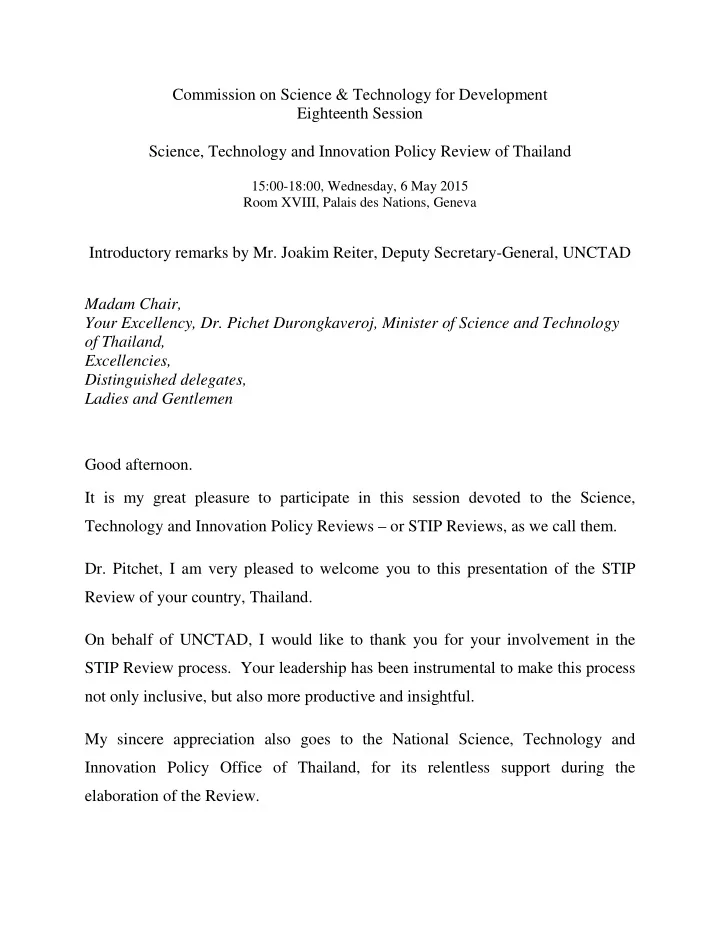

Commission on Science & Technology for Development Eighteenth Session Science, Technology and Innovation Policy Review of Thailand 15:00-18:00, Wednesday, 6 May 2015 Room XVIII, Palais des Nations, Geneva Introductory remarks by Mr. Joakim Reiter, Deputy Secretary-General, UNCTAD Madam Chair, Your Excellency, Dr. Pichet Durongkaveroj, Minister of Science and Technology of Thailand, Excellencies, Distinguished delegates, Ladies and Gentlemen Good afternoon. It is my great pleasure to participate in this session devoted to the Science, Technology and Innovation Policy Reviews – or STIP Reviews, as we call them. Dr. Pitchet, I am very pleased to welcome you to this presentation of the STIP Review of your country, Thailand. On behalf of UNCTAD, I would like to thank you for your involvement in the STIP Review process. Your leadership has been instrumental to make this process not only inclusive, but also more productive and insightful. My sincere appreciation also goes to the National Science, Technology and Innovation Policy Office of Thailand, for its relentless support during the elaboration of the Review.
Ladies and gentlemen, Perhaps not everybody in this room knows it, but the STIP Reviews are a result of an initiative of this Commission at the end of the 1990s. To date, we have concluded 13 Reviews, covering countries in Africa, Asia and Latin America. The Review of Thailand is our latest contribution. Today, I would like to take this opportunity to share with you three underlying principles of our work on STI policy. The first principle is the conviction that science, technology and innovation policies matter for development. Trade and investment policies are important, very important, but not sufficient. We need policies that promote technological learning and innovation. We need policies that foster structural change, improve firm competitiveness and create jobs. These STI policies are essential in our pursuit of inclusive and sustainable development. Technological development and innovation processes are complex; and so is their design and implementation. But the complexity of the task is not a reason not to undertake it, especially when the task has such a critical impact on the development prospects of a country. This is the rationale for UNCTAD's constant support to developing countries in science, technology and innovation policy.
The STIP Reviews is UNCTAD’s way to help and accompany countries through the complexities of implementing technology and innovations policies. This brings me to the second principle, which is embedded in a Chinese proverb: the journey is the reward . The main output of our work is not the publication of the final report, but the review process in itself. The process entails frank discussions with a wide range of STI actors from different sectors and institutions. It also offers an opportunity -- sometimes even the first one -- for these actors to discuss strategic issues related to STI and national development. Moreover, the actual process can act as a catalyser of existing change processes. Let me give you an example. The STIP Review of Thailand, even before its official publication, has already contributed to high-level policy discussions on STI policy reform. And this is not the only case. Other countries that have undertaken STIP reviews have reported similar experiences, There is a crucial ingredient in the success of our policy reviews, which brings me to the third principle : collaboration. Collaboration with national counterparts is essential. It enhances efficiency and effectiveness, and it also leads to wider and deeper collaboration. For example, the STIP reviews in Latin America resulted in cross-fertilization and sharing of
experiences beyond the STI policy reviews. This was an enriching experience for both, UNCTAD and the national offices entrusted with STI policy. Thailand also offers a good example, beyond the STIP Review. The National Science, Technology and Innovation Policy Office collaborates with UNCTAD on two fronts: 1) capacity-building on STI policy in developing countries and; 2) strengthening international STI policy networks. We have been very much impressed by the knowledge and experience of the National STI Policy Office and we look forward to further collaborating with them. And talking about collaboration, and before concluding, I would like to stress the complementarities of the work UNCTAD and the CSTD undertake and the importance of fostering collaboration. The CSTD provides an ideal forum for countries to share their experiences as they progress in the implementation of the recommendations made in the STIP reviews. And it is also a perfect platform to identify and disseminate good practices in STI policy for development I hope we can explore further mechanisms for collaboration, cross-fertilization and reinforcement of the common areas of work of the CSTD and UNCTAD. I look forward to hearing the presentation of the STI Policy Review of Thailand and the discussions it will surely stimulate. Thank you for your attention.
Recommend
More recommend